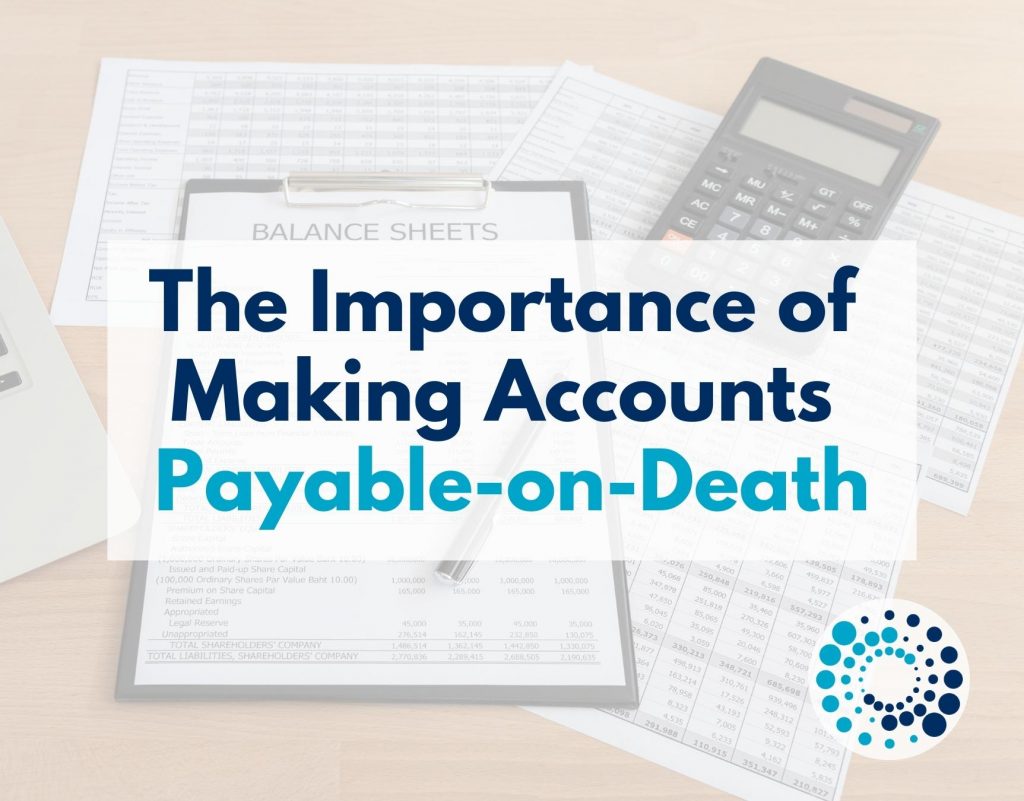Avoiding probates through payble-on-death accounts is a fast and easy way to save money and time. Taking the simple time to find this out will save your family stress and money later. People often ask, “how can I make sure my wishes are honored when I die?” One way is by designating payable-on-death (“POD”) beneficiaries on your banking accounts.
A leading cause in family disputes after the death of a matriarch or patriarch is money, unfortunately. I believe that leaving a legacy is more than money. But it is also ensuring that conflict is reduced. To that end, why not divvy up some of your assets now? By nature, there are some things you just cannot “contract away” (i.e. disputes or bits of jealousy), but what you can do is exercise your prerogative to distribute your money the way you want– before you die. We have compiled a list of frequently asked questions regarding the use of POD accounts. As you read, please keep in mind that POD’s are just one of the many avenues available to you as part of your estate planning.
What is a payable-on-death account?
A pay-on-death account is an account whereby the account owner(s) maintain full possession and control of the account during their lifetime. However, at the death of the last account owner, the account assets transfer to those designated as beneficiaries under the account agreement.
Who is eligible for a payable-on-death account?
Anyone with the legal capacity to contract may designate pay-on-death beneficiaries. POD accounts should not be used with the intent or hope that single beneficiary will divide the assets after your death. That will defeat the purpose of this estate planning tool. If it is your wish to divide the assets between multiple recipients, then each one of them should be listed as POD beneficiaries. If there is more than one or two beneficiaries, there may be better options for you.
What type of accounts are eligible?
Generally, checking, savings, and money market accounts are eligible for the POD benefit. Other account types have similar features, but they are referred to as either a transfer-on-death or Trotten Trust, which we will not discuss here.
When should I make my POD designation?
There is not a one-size fits all answer to this question as every family and case is different. Ideally, you should make the designation as soon as practicable. In any case, you should do so at your own volition!
Where can I open a POD account?
Most banking and savings institutions offer this feature. Call your bank today, if you want to learn more. In the alternative, you could contact us as we would be happy to discuss this matter as a part of your estate plan.
Why get a payable-on-death account?
POD accounts are a way to avoid probate, if properly created. Your family would take without court involvement and could have access to your funds immediately to cover expenses.
How do beneficiaries request distribution after my death?
This varies by jurisdiction, but in Florida, a beneficiary simply needs to provide the institution with proof of death (death certificate) and complete the required propriety forms and the funds should be released to them.
What if I change my mind?
If you have a change of heart, simply return to the bank and inform them that you want to either change your POD beneficiaries or that you want to remove the feature all together. Remember, your beneficiaries have absolutely no rights in your account until your death. It is your prerogative to add or remove beneficiaries at your discretion unless you requested that no changes be allowed. If this feature is removed from the account, your assets will either be distributed according to your estate planning documents (trust/will) or by intestacy. Your POD is considered revocable (unless stipulated otherwise) until your death, which at that time it becomes irrevocable.
Should I hire an attorney?
You do not need an attorney to create a POD account, however it might prove prudent to do so to ensure that your testamentary intent is captured by this non-probate device.
Photo created by mindandi -www.freepik.com
Lori Vella is an Estate Planning and Business Attorney. She works virtually throughout Florida and New York, but has her home office in Tampa, Florida. She is mom to a little boy which ignited the passion for helping other families. She and her son enjoy car rides, playgrounds and taking mini-adventures. They also have an organic garden that surprisingly yields vegetables. Lori considers herself well-versed in Seinfeld and welcomes any trivia!
Disclaimer: The Law Office of Lori Vella’s website contains general information directed to Florida residents. This firm does not intend to give legal advice through its pages and/or blog. If you need legal advice, we encourage you to find an attorney licensed in your state. This language on this website does not create an attorney-client relationship between you and this firm.

